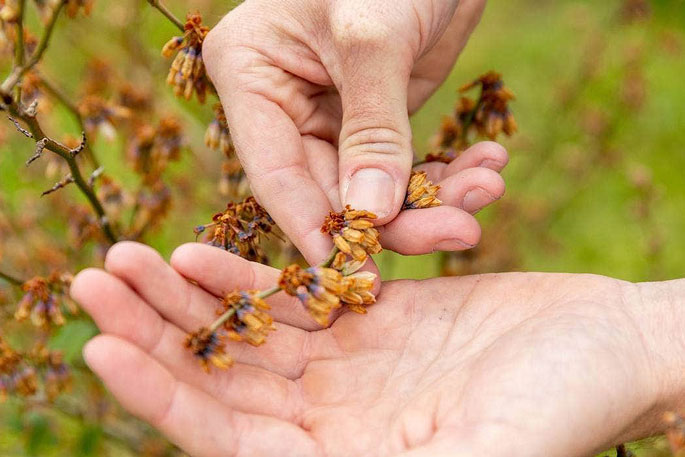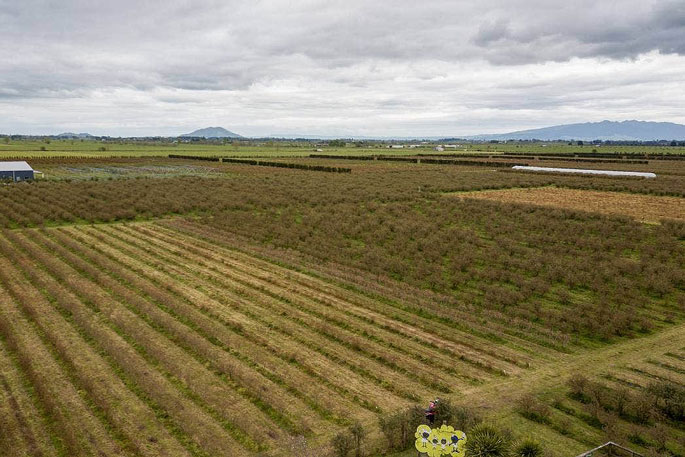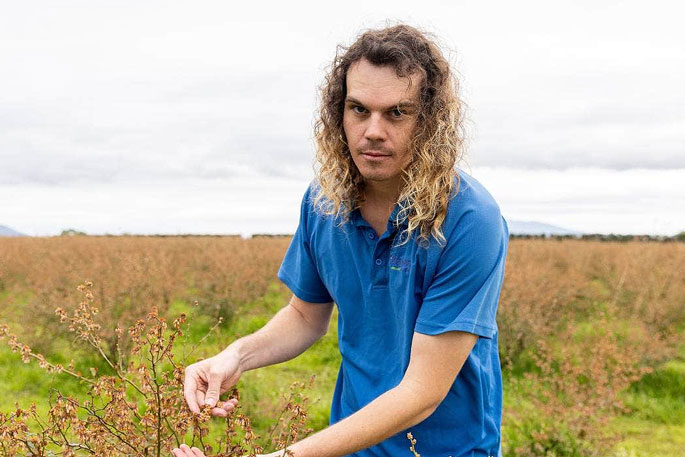After a sleepless, frosty night that got down to minus five degrees, a Waikato family watched their blueberry crops dying in front of their eyes.
Monavale Blueberries, New Zealand's largest certified organic blueberry orchard, sits on 44 hectares near Cambridge, and should be full of white flowering bushes and the deafening hum of bees.
Instead, a one-in-50-year frost has left the shrubs brown, the bees gone and an estimated 300 tonnes of potential produce destroyed.
Orchard manger Oliver de Groot, 25, says they've lost more than 90 per cent of their crop, which was in peak flowering when an unseasonal heavy frost hit the Waikato region on Friday morning.
 The Waikato orchard should be full of white flowering bushes and bees, but an October 7 frost decimated the crops.
The Waikato orchard should be full of white flowering bushes and bees, but an October 7 frost decimated the crops.
'We have never seen anything like this... We are all very upset by it. We did what we could and there is nothing else we could have done to prevent it.”
'We grow over 40 varieties of blueberries. The main reason, if an event like this happens we have some that are protected.”
However, MetService says -2.9 was the coldest October day on record since 1972, which for the berries was the exact time to do the most damage.
”If the frost had been light they may have been able to save more berries, however it got down to -5 degrees at ground level,” says de Groot.
The family used two helicopters from midnight until after sunrise, but when temperatures continued to dip they couldn't circulate the air fast enough to keep it above zero degrees.
The frost's full effect won't be known for some time, if and when other blueberry bushes produce. The frost also leaves the plants susceptible to fungi which can kill the bush.
A financial cost is hard to predict, de Groot says – a scarcity of blueberries could push prices up.
De Groot's grandparents started the business in 1985, his parents joined in 1995, his uncle and aunty in 2002 and him about eight years ago.
It takes about five years for bushes to be harvestable but established ones can produce anywhere from 15 to 25kgs, he says.
'Unfortunately blueberries don't come back for another 12 months, and that is if our plants survive.”
De Groot says the cost of insurance is more than what they make in a year.
Monavale exports the majority of the berries, but stocks some supermarkets and sells at local farmers markets.
De Groot says the family feel terrible for the knock-on effect the lost produce will have. They normally employ more than a 100 staff along with transport and packaging.
The berry farm's cafe Irresistibluewill remain open 7 days, from 9am to 4.30pm.
MetService meteorologist Tui McInnes says the Hamilton Airport weather station recorded its coldest day of the year on October 7.
'It's not necessarily outrageous because we are in spring, and we do get quite cold weather in spring, but you would expect the coldest temperatures in say July.”
 Monavale Blueberries sits on 44 hectares near Cambridge and grows more than 40 varieties – in part to protect itself from events like the frost.
Monavale Blueberries sits on 44 hectares near Cambridge and grows more than 40 varieties – in part to protect itself from events like the frost.
McInnes doesn't expect more similarly low temperatures in Waikato for the rest of October.
'The general consensus from growers most impacted by the frost is that they've lost between 90 – 100 per cent of their rabbiteye crop, and around 40 – 60 per cent of their high bush crop.”
And Blueberry New Zealand programme manager Rob Silberbauer is planning a 'Hail Mary” bid to MPI as growers affected by the frost say 'they've lost between 90 – 100 per cent of their rabbiteye crop, and around 40 – 60 per cent of their high bush crop”.
He says the organisation is trying to help provide growers with technical and emotional support.
'Growers have been struggling with labour, inflation, and Covid restrictions the last two years. They were excited about the prospect that perhaps those difficulties were behind them only for these frosts to decimate their yields and resulting profits for this coming season.”
Silberbauer says he's has several growers toying with the idea of giving up blueberry growing due to the buildup of difficulties.
”I am going to be contacting MPI to see if there's any possibility of financial relief for growers, however, this will be a ‘Hail Mary' as I don't believe there are any funds set up to help the horticulture sector during these events.”



1 comment
Sorry.
Posted on 13-10-2022 10:51 | By morepork
I understand how awful this is and extend my condolences to the family. But, there is a risk attached to any form of primary production and people who undertake it should recognize and seek to ameliorate those risks. Given that blueberries are so vulnerable to frost, maybe a percentage of the 44 hectares (say 10 hectares) could be planted with an alternative, more hardy crop? (Spinach, Walla Walla sweet onion, garlic, leeks, rhubarb, rutabaga, broccoli, kohlrabi, kale, cabbage, chicory, Brussels sprouts, corn salad, arugula, fava beans, radish, mustard, Austrian winter pea... are all recognized for very good frost resistance and might be able to provide a minimal cash flow to keep the business going. Horticulture is a "poor relation" when it comes to Government support and that should also be looked at.
Leave a Comment
You must be logged in to make a comment.